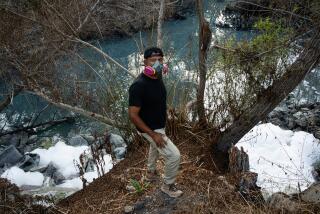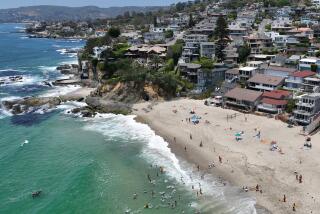It’s a Dirty Shame About the Beach
- Share via
A city like Huntington Beach should not compromise the health and safety of its residents and the public in exchange for tourist dollars. I believe the city is making decisions based on economic factors, and I believe our health and safety are at risk.
I live in Huntington Beach; I am a former state beach and city beach lifeguard (in Santa Cruz). I am an avid surfer, yet I stay out of the water more days than I go in because of the pollution problems. I considered returning to the lifeguard profession this summer, but after careful consideration I decided against even trying out because I refuse to subject myself to the risk of having to work in contaminated water, even if the city does provide me with free hepatitis shots.
On July 12, I noticed contamination signs posted along Huntington city beaches. The signs also were posted right in front of the Junior Lifeguard program. I watched as children in this program ran about 100 yards north of the signs and entered the water for their daily activities.
I asked a lifeguard involved with this program why the children were being directed to enter the water when signs were posted. He told me the water was contaminated, but not closed to swimming. I was appalled by his response.
But the truth is, his response is indicative of the attitude here in Huntington Beach, from the top down. Last year the beach was closed all summer. It miraculously opened for Labor Day weekend, then was re-closed. Something stinks here.
As a lifeguard in Santa Cruz in the 1980s, I can attest that we suffered a similar pollution problem. There was contamination that the city and lifeguard department refused to acknowledge. We all know why: money. I called the health department, signs were posted and I was allowed to educate the public about the quality of the water. My actions embarrassed the city and the lifeguard department, but I felt I owed it to the public to inform them so they could make a decision about water usage.
What does it mean for water to be “contaminated” but not “closed”? Why are the posted signs so small that even local residents miss them? Why doesn’t the city educate water users about the potential risk of swimming in contaminated water?
I know many of my fellow surfers and friends possess the same knowledge I do about the conditions of our water, yet they choose to surf anyway. A beach lifeguard in the city department told me he will continue to surf on a daily basis until the beach is officially closed.
What motivates these individuals? Rationalizations that they have good immune systems and that the pollution has always been there. Well, as adults they have the right to choose for themselves what is and is not acceptable to them. Children, in particular, do not.
I realize this elusive pollution is perplexing and poses a huge problem for Huntington Beach, but the dilemma has been economically based.
While I empathize with the city and I know they are working hard to find a solution to the contamination, they must also work extra hard to inform and protect the local residents and the public in general.
More to Read
Sign up for Essential California
The most important California stories and recommendations in your inbox every morning.
You may occasionally receive promotional content from the Los Angeles Times.













